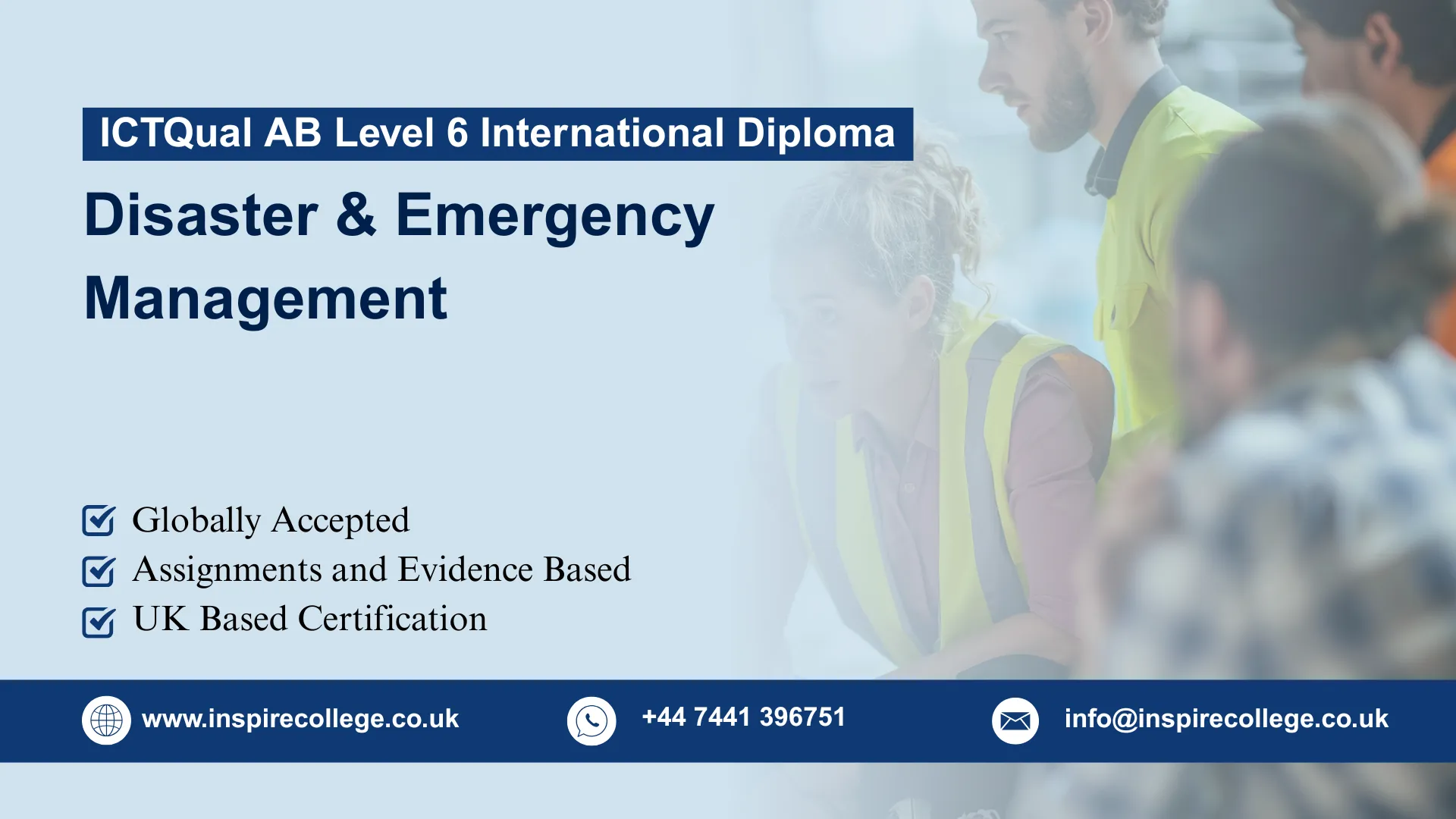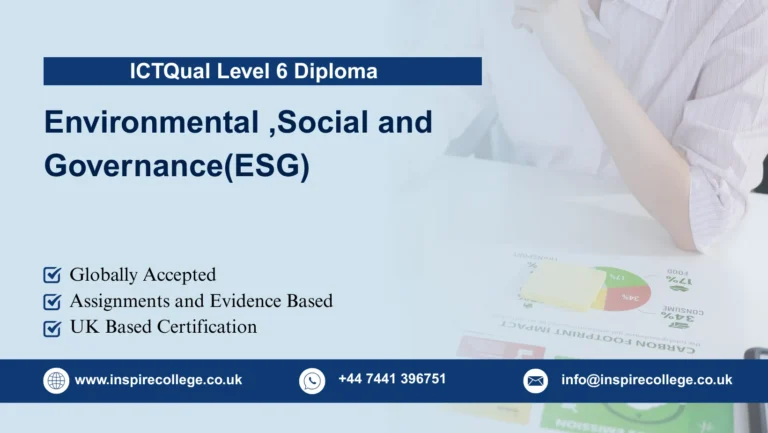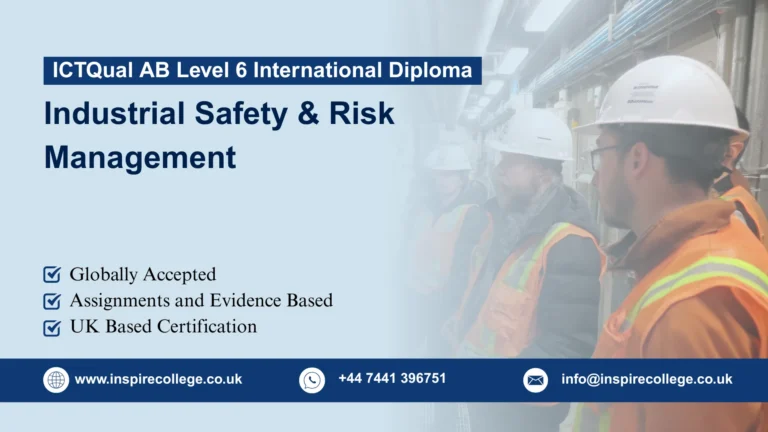
ICTQual AB Level 6 International Diploma in Disaster & Emergency Management
The ICTQual AB Level 6 International Diploma in Disaster & Emergency Management is a globally recognised qualification designed to equip learners with advanced knowledge and practical skills in disaster preparedness, emergency response, and risk mitigation. This three-year, 360-credit programme prepares learners to manage complex disaster scenarios, coordinate emergency operations, and implement effective mitigation strategies in both national and international contexts.
The programme combines theoretical frameworks with practical applications, covering areas such as disaster risk assessment, crisis management, emergency planning, humanitarian response, environmental hazards, and business continuity. Learners will gain expertise in strategic decision-making, resource management, and leadership skills required to operate effectively during high-pressure disaster situations.
Ideal for both fresh graduates and experienced professionals, the diploma empowers learners to develop critical thinking, problem-solving, and coordination skills essential for emergency management roles. Graduates can pursue careers as disaster response coordinators, emergency operations managers, risk assessment officers, humanitarian logistics specialists, or crisis management consultants.
By enrolling with our ICTQual AB Approved Training Centre, learners receive access to internationally recognised credentials, comprehensive study materials, practical case studies, and expert guidance throughout the programme. Completion of this diploma enhances career prospects locally and globally, equipping professionals to respond efficiently and strategically to natural disasters, industrial emergencies, and humanitarian crises.
Prepare to advance your career, master disaster management strategies, and make a tangible impact in protecting communities and organisations with the ICTQual AB Level 6 International Diploma in Disaster & Emergency Management – a qualification designed to meet the growing global demand for skilled emergency management professionals.
To enrol in the ICTQual AB Level 6 International Diploma in Disaster & Emergency Management, learners must meet the following criteria:
- Age Requirement: Learners must be at least 18 years old.
- Educational Background:
- A relevant Level 5 qualification in disaster management, emergency services, public safety, health & safety, or related fields is preferred.
- Fresh learners with strong secondary or vocational education in technical, administrative, or management-related subjects are also eligible.
- Professional Experience:
- For experienced learners, a minimum of 3–5 years of verifiable professional experience in emergency management, disaster response, risk assessment, or related roles is advantageous.
- Experience in crisis management, humanitarian operations, or safety compliance supports fast-tracked learning options.
- Language Proficiency: Learners must have proficiency in English to engage effectively with course materials, assessments, and assignments.
- Computer Literacy: Basic computer skills, including familiarity with MS Office, digital learning platforms, and data management, are required.
- Commitment to Learning: Learners must be dedicated to completing the three-year, 360-credit programme, including theoretical modules, practical assessments, and applied projects.
These entry requirements ensure learners are prepared to succeed academically and practically, equipping them with the knowledge and skills to advance in disaster and emergency management roles at both national and international levels.
Mandatory Units
This qualification, the ICTQual AB Level 6 International Diploma in Disaster & Emergency Management, consists of 36 mandatory units.
Year 1 – Foundations of Disaster & Emergency Management
- Introduction to Disaster and Emergency Management
- Types and Causes of Disasters
- Principles of Risk Assessment and Management
- Emergency Planning and Preparedness
- Crisis Communication and Stakeholder Engagement
- Introduction to Humanitarian Response
- Disaster Legislation, Policies, and Governance
- Environmental Impacts of Disasters
- Resource Management in Emergency Situations
- Introduction to Project Management in Disaster Response
- Health and Safety in Disaster Management
- Ethical Considerations in Emergency Operations
Year 2 – Applied Disaster & Emergency Management Practices
- Advanced Risk Assessment and Vulnerability Analysis
- Disaster Mitigation Strategies
- Emergency Operations and Response Coordination
- Incident Command Systems and Leadership
- Humanitarian Logistics and Supply Chain Management
- Community Preparedness and Awareness Programmes
- Disaster Recovery and Rehabilitation Planning
- Crisis Management for Organisations and Institutions
- Use of Technology and Digital Tools in Disaster Management
- Environmental Sustainability in Disaster Operations
- Applied Research Methods in Disaster Management
- Operational Planning and Simulation Exercises
Year 3 – Strategic Leadership in Disaster & Emergency Management
- Strategic Leadership in Disaster Management
- International Disaster Management Frameworks and Standards
- Policy Development and Regulatory Compliance
- Advanced Crisis and Risk Communication
- Disaster Resilience and Business Continuity Planning
- Climate Change and Disaster Risk Reduction
- Emergency Preparedness for Critical Infrastructure
- Governance, Ethics, and Accountability in Disaster Management
- Innovation and Emerging Technologies in Emergency Response
- Strategic Planning and Resource Mobilisation
- Independent Research Project in Disaster & Emergency Management
- Capstone Project: Applied Disaster & Emergency Management
Learning Outcomes for the ICTQual AB Level 6 International Diploma in Disaster & Emergency Management Studies 360 Credits – Three Years:
Year 1 – Foundations of Disaster & Emergency Management
Introduction to Disaster and Emergency Management
- Understand the fundamental concepts, scope, and objectives of disaster and emergency management.
- Analyse the roles of key stakeholders, agencies, and organisations involved in disaster management.
- Identify global and local trends in disaster occurrences and emergency responses.
- Evaluate the societal and economic impacts of disasters on communities and organisations.
Types and Causes of Disasters
- Identify and classify natural, technological, and human-induced disasters.
- Analyse the underlying causes and risk factors associated with different disaster types.
- Assess the potential impact of disasters on people, infrastructure, and the environment.
- Develop strategies for disaster prevention and mitigation based on hazard analysis.
Principles of Risk Assessment and Management
- Apply risk assessment frameworks to evaluate hazards and vulnerabilities.
- Identify risk reduction strategies and prioritise interventions.
- Develop and implement risk management plans for emergency situations.
- Monitor and evaluate the effectiveness of risk controls and mitigation strategies.
Emergency Planning and Preparedness
- Design comprehensive emergency preparedness plans for organisations and communities.
- Apply resource allocation and contingency planning techniques.
- Evaluate the effectiveness of preparedness measures through drills and simulations.
- Integrate emergency planning with organisational and governmental policies.
Crisis Communication and Stakeholder Engagement
- Develop effective communication strategies for disaster scenarios.
- Identify and engage key stakeholders in emergency management processes.
- Apply principles of transparency, accuracy, and timeliness in crisis communication.
- Evaluate the effectiveness of communication plans in real-world scenarios.
Introduction to Humanitarian Response
- Understand the principles and objectives of humanitarian response in disaster situations.
- Analyse roles of local and international humanitarian agencies.
- Apply frameworks for providing aid and relief to affected populations.
- Evaluate challenges and best practices in humanitarian operations.
Disaster Legislation, Policies, and Governance
- Understand national and international disaster management laws, policies, and governance structures.
- Apply regulatory frameworks to operational and strategic disaster management.
- Analyse compliance requirements for organisations and emergency responders.
- Evaluate the role of governance in effective disaster response and mitigation.
Environmental Impacts of Disasters
- Assess the environmental consequences of natural and human-made disasters.
- Apply sustainable practices in disaster prevention and response.
- Analyse strategies for environmental risk mitigation and recovery.
- Evaluate the effectiveness of environmental policies in disaster management.
Resource Management in Emergency Situations
- Identify and allocate human, financial, and material resources during emergencies.
- Apply logistics and supply chain principles to disaster response operations.
- Develop strategies for efficient and effective resource utilisation.
- Evaluate resource management plans for operational efficiency.
Introduction to Project Management in Disaster Response
- Understand project management principles as applied to disaster and emergency scenarios.
- Develop project plans, schedules, and budgets for emergency operations.
- Monitor project progress and implement corrective measures.
- Evaluate project outcomes for effectiveness and efficiency.
Health and Safety in Disaster Management
- Apply health and safety principles to disaster and emergency operations.
- Identify hazards and implement risk mitigation strategies for responders and affected populations.
- Develop safety protocols for field operations, shelters, and temporary facilities.
- Evaluate health and safety compliance during emergency operations.
Ethical Considerations in Emergency Operations
- Apply ethical frameworks to decision-making in disaster situations.
- Analyse dilemmas related to resource allocation, prioritisation, and humanitarian aid.
- Develop strategies for maintaining integrity, accountability, and fairness.
- Evaluate the impact of ethical decisions on stakeholders and affected communities.
Year 2 – Applied Disaster & Emergency Management Practices
Advanced Risk Assessment and Vulnerability Analysis
- Conduct detailed risk and vulnerability assessments for communities and organisations.
- Identify high-risk populations and critical infrastructure.
- Apply quantitative and qualitative tools for risk analysis.
- Develop targeted mitigation strategies based on vulnerability findings.
Disaster Mitigation Strategies
- Design and implement proactive measures to reduce disaster risks.
- Evaluate structural, non-structural, and policy-based mitigation approaches.
- Apply community engagement strategies for effective risk reduction.
- Assess the effectiveness of mitigation interventions.
Emergency Operations and Response Coordination
- Develop operational plans for emergency response activities.
- Coordinate multi-agency disaster response efforts effectively.
- Apply incident management protocols and standard operating procedures.
- Evaluate response efficiency and implement improvement measures.
Incident Command Systems and Leadership
- Understand the structure and function of incident command systems (ICS).
- Apply leadership principles during emergency and disaster situations.
- Coordinate resources, personnel, and operations under ICS frameworks.
- Evaluate leadership effectiveness during simulated or real incidents.
Humanitarian Logistics and Supply Chain Management
- Apply logistics principles to disaster relief and humanitarian operations.
- Plan and manage supply chains for food, medical, and relief materials.
- Coordinate transportation, warehousing, and distribution under emergency conditions.
- Evaluate logistics performance and identify operational improvements.
Community Preparedness and Awareness Programmes
- Design community education and awareness initiatives for disaster preparedness.
- Engage stakeholders in promoting resilience and risk reduction.
- Apply participatory approaches to enhance community readiness.
- Evaluate the effectiveness of awareness and preparedness campaigns.
Disaster Recovery and Rehabilitation Planning
- Develop plans for post-disaster recovery and rehabilitation.
- Analyse social, economic, and environmental recovery needs.
- Apply strategies for sustainable reconstruction and community resilience.
- Evaluate recovery projects for efficiency, effectiveness, and impact.
Crisis Management for Organisations and Institutions
- Develop organisational crisis management frameworks and contingency plans.
- Analyse organisational vulnerabilities and resilience strategies.
- Apply communication and coordination techniques during crises.
- Evaluate organisational crisis response effectiveness.
Use of Technology and Digital Tools in Disaster Management
- Explore digital platforms, GIS, early warning systems, and simulation tools.
- Apply technology to enhance risk assessment, monitoring, and response.
- Analyse emerging technological solutions in disaster management.
- Evaluate the effectiveness of digital tools in operational contexts.
Environmental Sustainability in Disaster Operations
- Implement sustainable practices in emergency response and recovery.
- Assess environmental impacts of disaster operations and mitigation measures.
- Apply climate adaptation strategies in emergency planning.
- Evaluate the long-term environmental outcomes of disaster interventions.
Applied Research Methods in Disaster Management
- Apply quantitative and qualitative research methods to disaster and emergency studies.
- Collect, analyse, and interpret data to inform decisions.
- Develop evidence-based recommendations for disaster mitigation and response.
- Evaluate research findings for practical applicability and policy relevance.
Operational Planning and Simulation Exercises
- Develop operational plans for simulated disaster scenarios.
- Apply emergency protocols and coordination strategies in exercises.
- Analyse decision-making, communication, and resource allocation during simulations.
- Evaluate performance and identify areas for improvement.
Year 3 – Strategic Leadership in Disaster & Emergency Management
Strategic Leadership in Disaster Management
- Develop and implement strategic plans for disaster management organisations.
- Apply leadership principles in high-pressure and complex emergency situations.
- Analyse organisational and community needs for effective disaster response.
- Evaluate strategic decision-making outcomes and implement improvements.
International Disaster Management Frameworks and Standards
- Understand global frameworks, treaties, and standards for disaster management.
- Apply international guidelines to operational and strategic planning.
- Analyse compliance requirements for local and national disaster management agencies.
- Evaluate the effectiveness of international frameworks in practice.
Policy Development and Regulatory Compliance
- Develop policies for disaster preparedness, response, and recovery.
- Ensure compliance with local, national, and international regulations.
- Analyse policy impacts on operational efficiency and community resilience.
- Evaluate policy implementation and recommend improvements.
Advanced Crisis and Risk Communication
- Apply communication strategies to manage crises effectively.
- Engage multiple stakeholders and media during emergency situations.
- Analyse communication effectiveness and public perception management.
- Develop advanced plans for proactive and reactive risk communication.
Disaster Resilience and Business Continuity Planning
- Develop business continuity and organisational resilience strategies.
- Analyse risks to critical operations and services.
- Apply contingency planning and recovery measures for business and infrastructure.
- Evaluate the effectiveness of continuity plans under simulated or real conditions.
Climate Change and Disaster Risk Reduction
- Understand the relationship between climate change and disaster risk.
- Apply mitigation and adaptation strategies to reduce climate-related vulnerabilities.
- Analyse environmental, social, and economic impacts of climate change on disasters.
- Evaluate policies and interventions for effective climate risk reduction.
Emergency Preparedness for Critical Infrastructure
- Identify vulnerabilities in critical infrastructure and essential services.
- Develop emergency preparedness plans for infrastructure protection.
- Apply monitoring, maintenance, and rapid response strategies.
- Evaluate infrastructure resilience and emergency readiness.
Governance, Ethics, and Accountability in Disaster Management
- Apply principles of good governance, ethics, and accountability in disaster operations.
- Analyse decision-making frameworks for transparency and integrity.
- Evaluate compliance and ethical considerations in emergency management.
- Develop strategies to enhance accountability in disaster response initiatives.
Innovation and Emerging Technologies in Emergency Response
- Explore innovations and emerging technologies in disaster monitoring, response, and recovery.
- Apply technology solutions to enhance efficiency, safety, and coordination.
- Analyse trends such as drones, AI, and data analytics in emergency management.
- Evaluate the practical implementation of new technologies in field operations.
Strategic Planning and Resource Mobilisation
- Develop strategic plans for national, regional, or organisational disaster management programmes.
- Apply resource mobilisation techniques to secure funding, equipment, and personnel.
- Analyse operational and strategic resource allocation for maximum efficiency.
- Evaluate strategic plan outcomes and implement improvements.
Independent Research Project in Disaster & Emergency Management
- Conduct independent research on a disaster or emergency management topic.
- Apply critical thinking, analytical, and problem-solving skills.
- Develop evidence-based recommendations for policy or operational improvements.
- Present research findings in a professional and academically rigorous manner.
Capstone Project: Applied Disaster & Emergency Management
- Integrate theoretical knowledge and practical skills to address real-world disaster management challenges.
- Develop comprehensive operational or strategic disaster management plans.
- Demonstrate leadership, coordination, and decision-making capabilities.
- Evaluate outcomes and provide recommendations for continuous improvement in emergency management practice.
The programme is designed to cater to a wide range of learners, from fresh entrants into the disaster management field to experienced professionals seeking career growth and leadership roles.
1. Fresh Graduates and Entry-Level Learners
- Individuals aged 18 years or older with a keen interest in disaster and emergency management.
- Learners who have completed relevant secondary or vocational education in safety, logistics, public safety, or environmental studies.
- Candidates looking to build foundational knowledge in disaster types, risk assessment, emergency planning, and humanitarian response.
- Learners aiming to develop practical and analytical skills to work in emergency services, NGOs, or government agencies.
2. Early Career Professionals
- Emergency responders, safety officers, junior disaster management coordinators, or public service employees seeking advanced knowledge.
- Learners interested in specialising in areas such as crisis communication, risk mitigation, emergency logistics, or humanitarian operations.
- Professionals aiming to enhance career prospects, improve operational competence, and take on leadership responsibilities.
- Individuals committed to applying both theoretical knowledge and practical skills in real-world disaster and emergency scenarios.
3. Experienced Professionals
- Individuals with 3–5 years or more of professional experience in emergency services, disaster response, safety management, or humanitarian operations.
- Professionals seeking to formalise and validate their skills with an internationally recognised Level 6 qualification.
- Learners aspiring to senior management, consultancy, or strategic roles in disaster management organisations, NGOs, or government agencies.
- Individuals aiming to broaden expertise in climate risk, policy development, strategic planning, and emerging disaster technologies.
4. Career Switchers and Enthusiasts
- Individuals from related sectors such as logistics, healthcare, environmental management, or public administration looking to transition into disaster management.
- Learners passionate about emergency response, humanitarian aid, and resilience planning, seeking structured professional training.
- Candidates motivated to combine theory with practical exercises to achieve professional competence in disaster and emergency management.
Key Attributes of Ideal Learners
- Commitment to completing the three-year, 360-credit programme.
- Strong problem-solving, analytical, and decision-making skills.
- Effective communication and teamwork abilities for collaborative projects and emergency operations.
- Willingness to stay updated with emerging technologies, international disaster frameworks, and best practices.
- Dedication to maintaining ethical, safe, and accountable practices in all disaster and emergency operations.
As an ICTQual AB Approved Training Centre, we offer learners two flexible pathways to achieve the Level 6 International Diploma in Disaster & Emergency Management. All learners must enrol with our centre to access course materials, guidance, and assessments.
Route 1 – Experienced Professionals
Designed for learners with 6+ years of verifiable professional experience in disaster management, emergency response, risk assessment, or related fields:
- Submission of evidence demonstrating prior work experience, responsibilities, and achievements in emergency planning, crisis management, or humanitarian operations.
- Evaluation of existing knowledge and skills against the diploma’s learning outcomes by our centre.
- Targeted guidance or additional training provided if gaps are identified.
- Successful verification may lead to diploma certification without completing all 36 assignments, enabling fast-tracked recognition of professional expertise.
Route 2 – Fresh Learners
Designed for learners without prior professional experience in disaster and emergency management:
- Completion of the full three-year, 360-credit programme, including all 36 assignments, practical assessments, applied projects, and simulations.
- Assessments structured to demonstrate both theoretical understanding and practical application in real-world disaster management scenarios.
- Upon successful completion, learners are awarded the ICTQual AB Level 6 International Diploma in Disaster & Emergency Management.
Benefits of Both Routes
- Gain a globally recognised, industry-relevant qualification.
- Validate prior professional experience (Route 1) or gain comprehensive expertise in disaster risk reduction, emergency response, and strategic management (Route 2).
- Enhance career prospects in operational, managerial, and strategic roles within government agencies, NGOs, humanitarian organisations, and emergency services.
- Develop leadership, analytical, and decision-making skills for effective disaster and crisis management.
Register Now
FAQs for ICTQual AB Level 6 International Diploma in Disaster & Emergency Management






